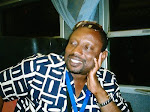Know Your History - History of An African People:
In a White House memo dated Tuesday, January 28, 1969 to President Nixon, former Secretary of State, Henry Kissinger describes the Igbos as “the wandering Jews of West Africa-gifted, aggressive, westernized, at best envied and resented, but mostly despised by their neighbors in the federation”(foreign relations document, volume E-5, documents on Africa 1969-1972).
Kissinger's description aptly portrays the Christian Igbos and their experience in Nigeria. Over the years, the Igbos have been the victims of numerous massacres, that they have lost count. Most of the violence directed against the Igbos have been state sponsored. One can say that the Igbos knew how to spell “state sponsored terrorism” before the rest of the world did. The state sponsored terrorism directed against the Igbos in 1966, led to the declaration of the Republic of Biafra by the Igbos and subsequent civil war. Over two million Igbos died in the civil war, primarily by starvation. One will not be wrong, if they call the Igbos the “Tutsis” of Nigeria. Today, an Islamic terrorist Conglomerate led by the dreaded Boko Haram are still slaughtering Igbos and other Christians in Northen Nigeria. Igbos have always seen themselves as a bulwark against the spread of Islam to Southern Nigeria, and as a result, a perennial target of Islamic zealots.
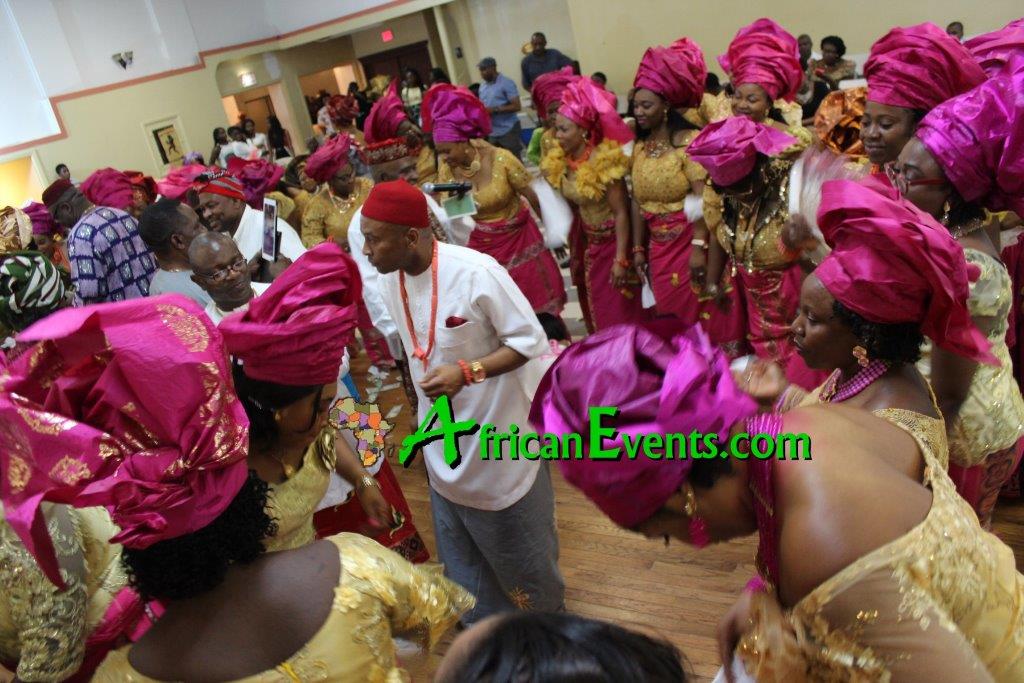
African events picture of Ibo women dancing and celebrating
However, the Igbos are one of the largest and most distinctive of all African ethnic groups. Predominantly found in Southeastern Nigeria, they number about 40 million worldwide, with about 30 million in Nigeria. They constitute about 18% of Nigeria's population, with significant Igbo populations in Cameroon, Equatorial Guinea, Gabon and the Ivory Coast. Igbos predominate in five states in Nigeria-Imo, Anambra, Ebonyi, Enugu and Abia. In three other states- Rivers, Lagos and Delta, they constitute almost 25% of the population.
During the slave trade, Igbo slaves were known to be the most rebellious. Most of the slave rebellions in the United States, Haiti, Jamaica, Belize, Trinidad and Tobago, Barbados and Guyana were led by Igbo slaves. In South Carolina, Igbo slaves were reported to have drowned themselves, rather than be kept as slaves. Today that place is called Ebo Island in commemoration of the slaves who died there. The Gullahs are Igbo. Igbos were one of the 13 African ethnic groups that provided the bulk of the slaves who were brought to the Americas. Majority of the slaves who ended up in Virginia, Alabama, Tennessee, Maryland, Arkansas, Mississippi, South and North Carolina and Georgia were Igbo. An Igbo museum has been built in Virginia to honor the contribution of Igbo slaves to the state. One of the Igbo slaves who was sent to Liberia by the American Colonization Society-Edward Roye- became the fourth president of Liberia. Another Igbo slave, Olaiduah Equiano wrote the famous slave chronicles.
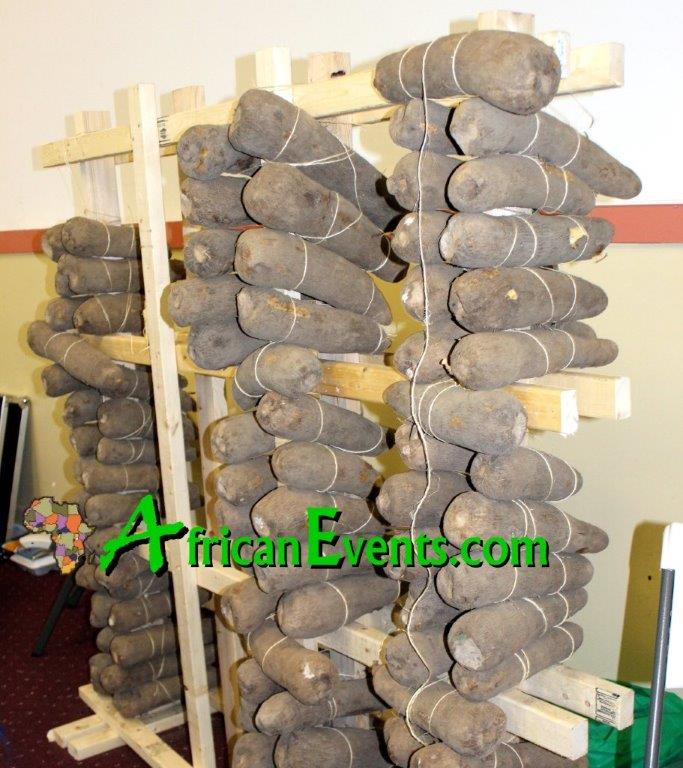
Picture of a make shift Ibo barn of yam at an African event
During the colonial period, the British disliked the Igbos, because of their supposedly uppitiness and argumentativeness. During military service in Burma and India, the pride of Igbo soldiers amongst other African soldiers was proverbial. In the company offices and orderly rooms, the first few words from the White officer speaking to an Igbo soldier was followed by “don't argue, you! Or “you want to be too clever”, and similar expressions. Their expressive and aggressive mentality which they enjoy in their culture at home, does not always allow them to accept false charges or accusations without responding. The late famous writer, Langston Hughes, observed “the Igbo looks proud because he is bred in a free atmosphere where everyone is equal. He hates to depend on anyone for his life's need. He does not mind if others look proud. He has much to be proud of in his land. Nature has provided for him. He is strong and able to work or fight. He is well formed. He is generally happy in his society where no ruler overrides his conscience. He likes to advance and he is quick to learn. He likes to give rather than take”.
Culturally, the Igbos are a very diverse group with different clans, families, subcultures, and subgroups. However, the customs are similar with local varieties. Although there are disagreements about the origins of the Igbos, there is a consensus that they originated from Nri in Anambra State of Nigeria. The language of the Igbos is Igbo or Ibo. It is one of the largest spoken languages in Africa, with Hausa and Yoruba. Igbo speaking people are divided into five geographically based subcultures-Northern Igbo, Western Igbo, Southern Igbo, Eastern Igbo and Northeastern Igbo. Not as urbanized as the Yoruba, they live in multitudinous villages, fragmented into small family groups. They do not have hereditary chiefs like the the Yoruba or Hausa/Fulani. Every Igbo more or less is his or her own master. The Igbos operate the “Umunna System”, which emphasizes the patrilineal heritage, rather than the matrilineal. Some of the important Igbo cities include, Onitsha, Enugu, Umuahia, Aba, Asaba, Abakaliki, Owerri, Nsukka.
In commerce, the Igbos are a mobile, vividly industrious people who have spread all over Nigeria and Africa as traders and small merchants. In countries like Gabon, Ivory Coast, Equatorial Guinea, Sierra Leone, Togo, and Gambia, Igbo traders predominate in retail trade. Most Igbos are clannish, despite their individualism and hold closely together in non Igbo communities. They are often very unpopular in the communities they live in, because they push very hard to make money and often dominate the retail business in alien communities. In his book, the Brutality of Nations, Dan Jacobs describes the Igbos “as ambitious, dynamic and progressive people whose education and abilities did not endear them to those among whom they lived. Even during British rule, there were massacres of Igbos in Northern Nigeria-in Jos in 1945 and in Kano in 1953. The Igbos have acquired the sobriquet, Jews of Africa”.
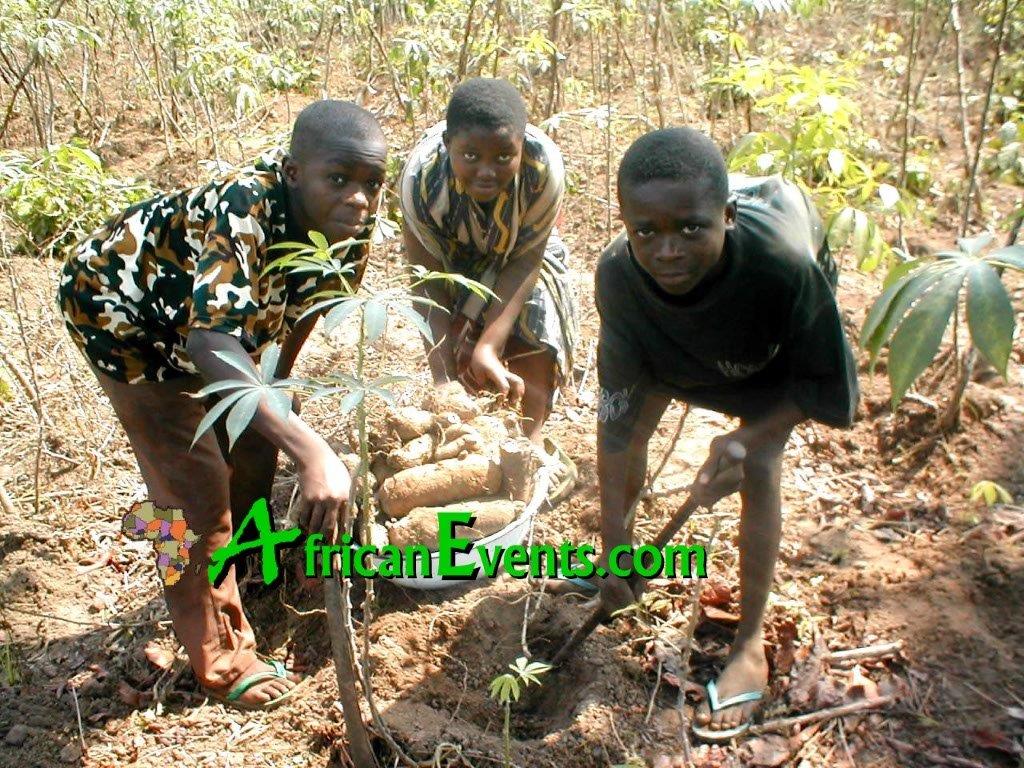
Industrious Ibo youths in a farm - working to survive from a young age
Education is highly emphasized and given priority in Igboland. Converted to Christianity by Catholic, Anglican and Presbyterian missionaries, they took up self improvement with such enthusiasm, that by the 1960's, the Igbos had the highest percentage of doctors, lawyers, engineers, physicists, and teachers than any other ethnic group in Africa. Because of the abundant educational talent in Igboland many newly independent African nations recruited them to fill vacancies in their civil service. The first American style university built in Africa was in Igboland-the University of Nigeria at Nsukka. Its founder, Dr. Nnamdi Azikiwe was a graduate of Lincoln University in Pennsylvania. The Igbos and the Yorubas are the most educated ethnic group in Africa.
Politically, the Igbos are very effervescent and volatile. According to author Dan Jacobs “for Britain and for the British civil servants who continued to work in the Northern Region, the Igbos have always been a troublesome element in the federation, a people with a democratic tradition who are not easily controlled. Many British were glad to see them out of a central position in the federation, as were those who had driven them back to their homeland and those who now held the civil service and other jobs they had left”. The Igbos had been the most ardent advocates of a united Nigeria. Upon independence in 1960, an Igbo, Dr Nnamdi Azikiwe-American educated- became the first President and Governor General, while another Igbo, Aguiyi Ironsi became the first indigenous military chief. Leadership of most of the elite universities in Nigeria were also occupied by the Igbos.
Following the military coup of January 1966, which the Igbos were accused of initiating, Aguiyi Ironsi, an Igbo, became President and Supreme Commander of the armed forces. Tensions rose very high in the country resulting in the massacre of Igbos in May 1966. In July 1966, a Hausa/Fulani/Tiv inspired military coup overthrew Ironsi's regime and a terrible massacre of the Igbos began in earnest. This led to the secession of the former Eastern Nigeria and the declaration of the Republic of Biafra. This eventually led to the civil war. According to George Orick, an American businessman and consultant to UNICEF who was in Nigeria at the time, one million Igbos were to be killed in order to avenge the death of a man called Ahmadu Bello, who was the Sardauna of Sokoto-Prince of the Islamic Sokoto Caliphate. He reported that “one could hear on Northern Nigerian radio the reading of long lists of Igbos who were targeted for extinction”.-see Goddell team report, congressional Record of February 15, 1969, pp51976-7. The Igbos believe, and rightfully so, that had they not fought back, their fate would have been worse than that of the Tutsis in Rwanda. The same way Northern Nigerian radio was exhorting the Hausa/Fulanis to kill the Igbos, was the same way Radio Milles Collines was exhorting the Hutus to slaughter the Tutsis in Rwanda.
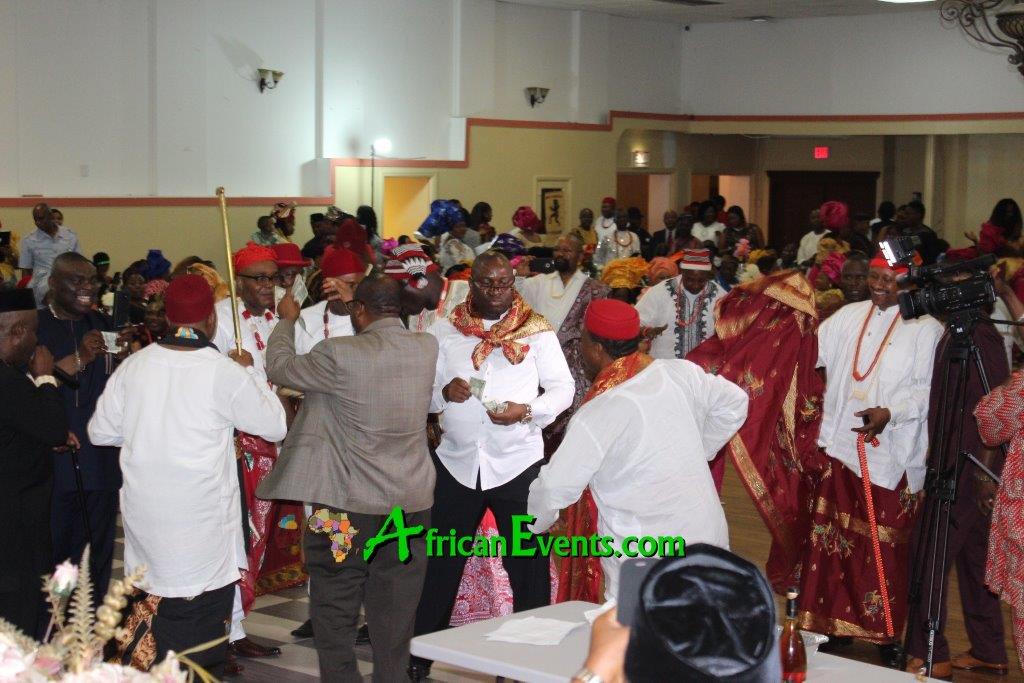
Ibo men at an African event - known for their ambition, prowess, and tradition
Similarly, Heinrich Jiggs, a Swiss businessman in Nigeria who later became the chief Red Cross delegate in Biafra, reports seeing one of the circular letters in Northern Nigeria which stated that every Igbo down to the age of six would be killed. A Canadian Journalist, Alan Grossman, who had been West African Bureau Chief of Time Life News Service in Lagos from May 1966 to June 1968, testified before the External Affairs Committee of the Canadian House of Commons on what he saw. He told the committee “many thousands of Igbos were slaughtered in towns and villages across the north, and hundreds of thousands of others were blinded, crippled or maimed or in majority of cases, simply left destitute as they attempted to flee to the Igbo homeland in Eastern Nigeria. Some of the fleeing refugees did not make it home. On one train that arrived in the East, there was the corpse of a male passenger whose head had been chopped off somewhere along the line. Another group of Igbo refugees men, women and children whom I happened to see-I would say 100 or more of them-were waiting in the railway station in the city of Kano, the largest city in Northern Nigeria, for about three days, with no security guards, for the arrival of a refugee train, and a land rover full of government soldiers came and mowed them down with automatic weapons. Igbo shops and Igbo hotels were ransacked and looted, while blocks of non Igbo businesses were carefully left untouched”. (see minutes of Canadian House of Commons proceeding, external Affairs Ref. 7 pp. 239-40).
In the final analysis, Dan Jacobs, in the Brutality of Nations, summarizes the plight of the Igbos in the following way, “to the other Nigerians, the Igbos were not only leaving Nigeria, they were departing with the oil under the lands with which they are seceding. Here lay the explanation of the paradox that the Nigerians had driven the Biafrans out, yet seemed to be fighting to keep them in the federation. What they actually wanted was the land the Igbos were on and what lay under it-without the Igbos”.
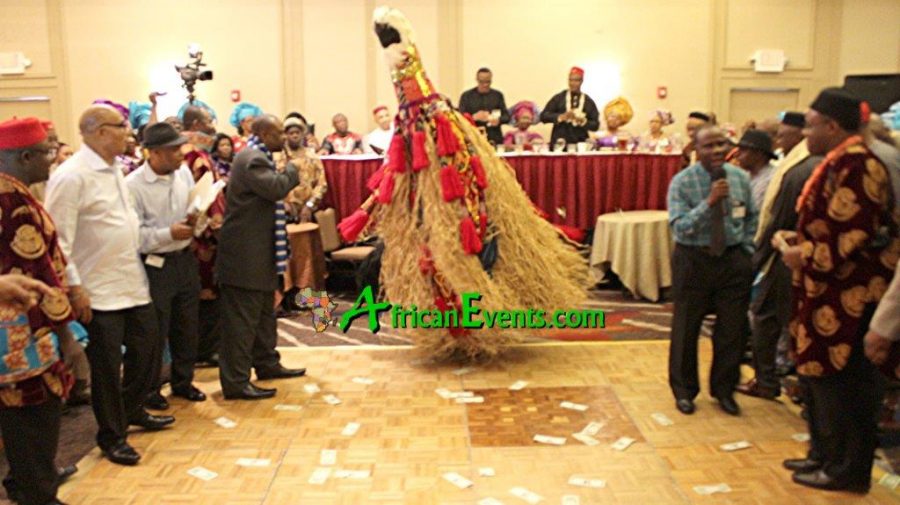
Picture of Ibo masquerade performing at an African event
Some internationally recognized Igbo personalities include former president Nnamdi Azikiwe, former military ruler Aguiyi Ironsi, writer Chinua Achebe, former Biafran leader Odumegwu Ojukwu, former justice at the World Court Daddy Onyeama, former commonwealth secretary general Emeka Anyoku, former middleweight and lightheavyweight champion of the world Dick Tiger and Cardinal Francis Arinze-Pope in waiting.. Some African Americans of Igbo ancestry include evangelist T.D. Jakes, actor, scholar and athlete Paul Robeson, actors Forrest Whitaker and Blair Underwood.
***
ABOUT THE AUTHOR: Dr. Leonard Madu is President of the African Caribbean Institute and African Chamber of Commerce in Nashville, Tennessee.
https://www.africanevents.com/history-of-an-african-people-the-igbo-people-of-nigeria-jews-of-africa-by-dr-leonard-madu/
 Tutto pronto a Cisterna per la terza edizione della Festa dei Popoli, manifestazione interculturale che celebra la ricchezza della diversità.
Tutto pronto a Cisterna per la terza edizione della Festa dei Popoli, manifestazione interculturale che celebra la ricchezza della diversità.



















